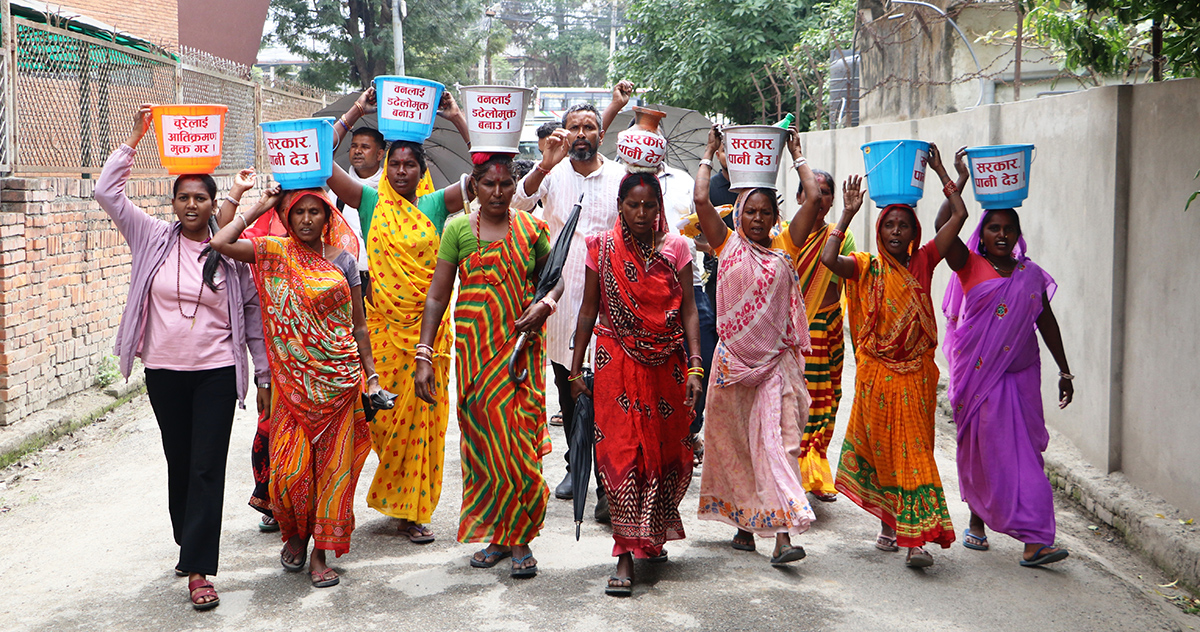Protesters stand in Kathmandu as illegal mining dries up Nepali rivers
Some 20 people walked for 25 days from the southern province of Madhesh to the capital, carrying empty buckets on their heads. In the Chure region, which is home to a mountain range and several streams, natural springs have dried up due to decades of overuse. The government, however, is ignoring the issue.
Kathmandu (AsiaNews) – A group of environmentalists arrived in Nepal’s capital Kathmandu almost a week ago in a campaign to protest the degradation of the Chure, a mountain range on the border with India, whose water sources are drying up due to decades of uncontrolled sand mining from river beds.
The protesters, 22 in all, walked for 25 days from the southern province of Madhesh carrying empty buckets that read: “Government, give us water” – “Save trees for water” – “Stop the encroachment of Chure”.
They will not leave, they said, until the government heeds their demands. But so far, the latter has ignored the group of protesters, one of whom is Sabita Kumari Mahato, the younger sister of Dilip Kumar Maharo, an environmentalist killed four years ago for protesting illegal mining.
Mahato told local media that despite the personal tragedy she and her family have endured, the fight for the preservation of the Chure range today concerns the entire region and, soon, the entire country.
“We can’t survive without water, nobody can,” Mahato explained. “So why is the government barely doing anything about this?”
In some villages, local water sources, which are also crucial for farming, have dried up completely and residents are forced to wait for government water tankers.
“At this rate, if the government remains idle, soon we’ll have to import water as well,” Mahato lamented.
On Tuesday, the Nepali parliament began discussing the budget, and the group of environmentalists hoped the government would allocate more funds for reforestation and water conservation than last year's budget. This was not the case: the government did not make any changes to existing projects.
In 2014, the President Chure-Tarai Madhesh Conservation Development Board (PCTMCDB) was set up while the Chure was recognised as a protected area, including the Tarai Plains, traditionally Nepal’s food basket.
Recent research suggest, however, that the efforts made by the government have been futile. In fact, the creation of ponds and irrigation canals has been too slow compared to the pace of mining and deforestation.
Experts note that an independent fund with full authority is needed to deal with different environmental issues.
Sunil Yadav, coordinator of the Chure and Forest Conservation Committee and head of the protest campaign, said it is shameful that locals have to rely on tankers for their daily needs.
“Tarai is lauded as the food basket of the country, but in the years to come, there will be nothing much to see because everything is slowly drying up,” he said.
“You can see the effects of a warming climate everywhere – the Tarai, hills, and the mountains. Soon the degradation of Chure will affect the whole nation, because where will the grains come from?”
“Our ancestors never had to undertake such a huge march of suffering just for water. I cannot imagine what lies in store for the coming generations,” said Sangita Devi Sada, who joined the campaign because the rivers in her village stopped flowing two years ago during the dry season.
“My feet are covered in blisters. I can barely walk. Whom do I share this suffering with? Who will listen to us?” she asks.
“The perennially flowing Kamala River has started drying up. It is becoming unrecognizable,” said Sonabatti Mukhiya, 70.
“They are bringing huge tippers and excavators to extract sand and boulders at night. The police just watch. They are all hand-in-glove. If this is not stopped, the Kamala River will soon vanish without a trace.”
Sabita, Sunil, Sangita, Sonabatti, and the other Nepalis who marched to Kathmandu have 12 demands for the government, including a law to protect the mountain range, a ban on sand mining from riverbeds, a stop to construction in the name of development, and an investigation into activities in forests, where illegal mining is often taking place.
16/06/2025 17:30
29/01/2025 18:53







.png)










